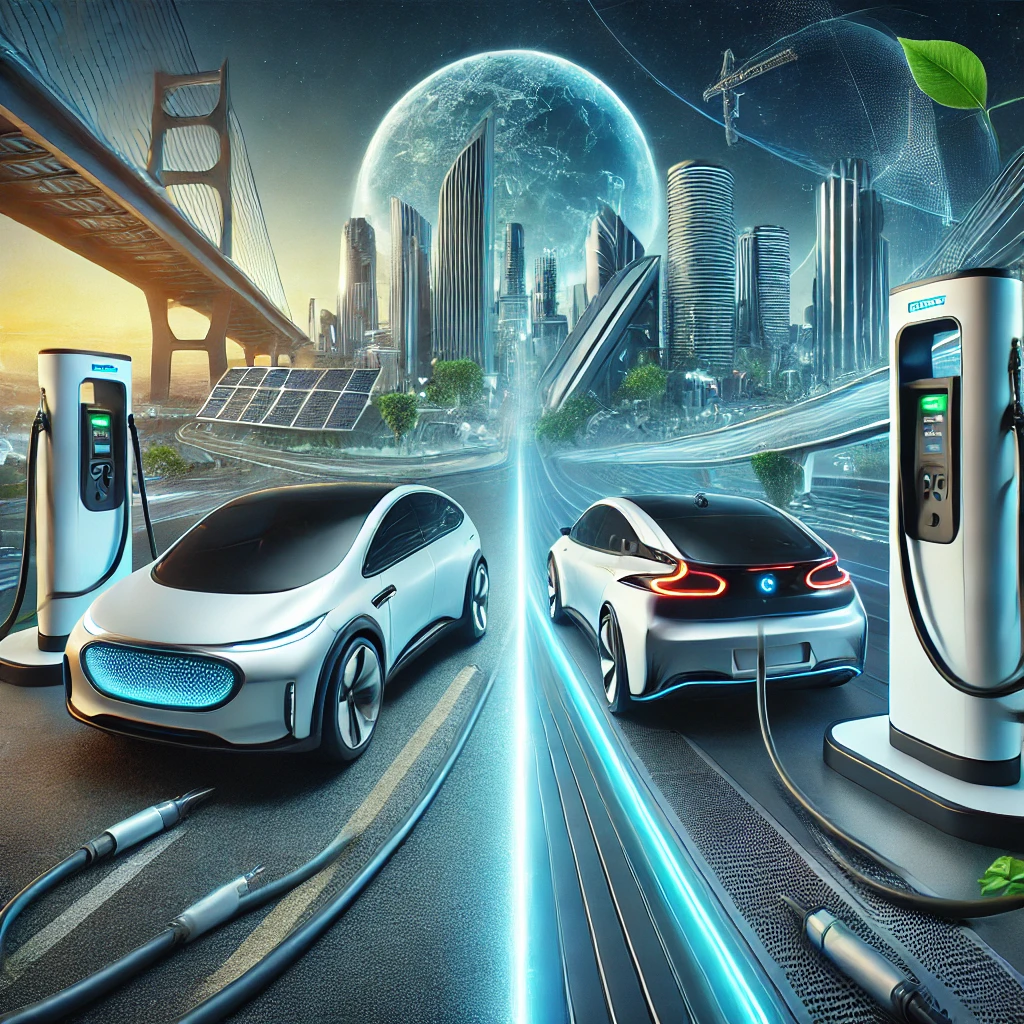The automotive sector is experiencing a profound shift as the world turns to sustainable energy options. In the running for the future of green transportation are Electric vs. Hydrogen Cars—two technologies that have the potential to lower carbon emissions and change the face of transportation. But what’s the preferred option for consumers, businesses, and the planet? In this exhaustive comparison, we will delve into the major distinctions between Electric vs. Hydrogen Cars, considering factors like efficiency, cost, infrastructure, performance, and the environment to conclude which technology takes the lead.
1. Knowing the Fundamentals
Electric Cars: How They Work: Electric cars employ rechargeable lithium-ion batteries to power an electric motor. Power for the batteries comes from charging stations or residential charging units, rendering EVs a very energy-efficient choice for future transport.
Hydrogen Cars: How They Work: Hydrogen fuel cell cars (FCEVs) produce electricity by reacting hydrogen with oxygen in a fuel cell, emitting only water vapor as waste. Unlike EVs, which have stored energy, hydrogen vehicles create electricity when needed, enabling longer distances and faster refueling time.
2. Energy Efficiency and Conversion
Efficiency is key while comparing Electric vs. Hydrogen Cars to decide on their feasibility.
Electric Car Efficiency: EVs are very efficient, with battery-to-wheel efficiency of about 85-90%. This implies that a large percentage of the energy stored in an EV battery is used for propulsion with little loss.
Hydrogen Car Efficiency: Hydrogen vehicles, however, have a significantly lower efficiency rate. The electrolysis process, hydrogen storage, and fuel cell conversion have an overall efficiency of approximately 30-40%. A lot of energy is wasted in hydrogen production, compression, and conversion to electricity.
Winner: Electric vehicles, because they are more energy efficient.
3. Refueling vs. Charging Time
Electric Car Charging Time: One of the greatest disadvantages of EVs is charging time. Depending on battery size and type of charger:
Fast Chargers (DC Superchargers) – 30-60 minutes to 80% charge. Level 2 Chargers (Home Charging) – 4-8 hours to fully charge. Standard Wall Outlet – 12-24 hours.
Hydrogen Car Refueling Time: Hydrogen cars have an edge here. Refueling a hydrogen car at a hydrogen station takes merely 3-5 minutes, just like gasoline-powered cars.
Winner: Hydrogen cars, because of their ability to refuel quickly.
4. Infrastructure and Availability
Electric Charging Infrastructure: EVs have a mature and expanding charging infrastructure. Public charging networks like Tesla Superchargers, ChargePoint, and Electrify America are growing rapidly. Home charging facilities also make EVs even more convenient to use on a daily basis.
Hydrogen Refueling Infrastructure: Hydrogen fueling stations are very scarce, with the majority of them located in specific regions such as California, Japan, and certain regions in Europe. The exorbitant cost of constructing hydrogen refueling stations (approximately $1-2 million per station) discourages extension.
Winner: Electric cars, thanks to their extensive charging infrastructure.
5. Cost Comparison
Electric Car Costs: Purchase Price: EVs are now more affordable, with vehicles such as the Tesla Model 3, Nissan Leaf, and Hyundai Ioniq 5 being competitively priced. Running Costs: Electricity is less expensive than hydrogen, and maintenance is cheaper because there are fewer moving parts.
Hydrogen Car Costs: Purchase Price: Hydrogen vehicles, such as the Toyota Mirai and Hyundai Nexo, are still pricey because of low production volumes and sophisticated fuel cell technology. Fuel Cost: Hydrogen is significantly more expensive than electricity. As of 2024, hydrogen costs $10-$15 per kg, while electricity costs about $0.10-$0.30 per kWh.
Winner: Electric cars, due to lower purchase, maintenance, and fueling costs.
6. Environmental Impact
Electric Cars’ Impact: EVs emit no tailpipe emissions, but their impact on the environment is determined by the source of electricity. EVs are a clean and sustainable option if they are powered by renewable energy. Nevertheless, battery manufacturing, particularly lithium mining, is environmentally taxing.
Hydrogen Cars’ Impact: Hydrogen FCEVs emit no emissions as well, but most hydrogen today is made from fossil fuels (gray hydrogen), which cancels out environmental gains. Green hydrogen, made through electrolysis from renewable energy, is cleaner but still not readily available.
Winner: Electric cars, for their lower carbon emissions now.
7. Driving Range and Performance Electric Car Range
The EVs of today have better ranges, with the range of over 400-500 miles between charges in certain models (Tesla Model S, Lucid Air). Nevertheless, range anxiety can still be felt by some buyers.
Hydrogen Car Range: Hydrogen vehicles feature longer ranges compared to most electric vehicles, having a range of 300-400 miles on a tank. Because refilling is rapid, they are designed for longer highway driving.
Winner: Hydrogen cars, owing to greater range driving.
8. Market Adoption and Future Potential Electric Cars’ Growth
The EV market is growing exponentially, with almost 14 million EVs sold in 2023. Governments across the globe are promoting the adoption of EVs, contributing further to growth. Large car companies such as Tesla, Ford, and Volkswagen are heavily investing in EV technology.
Hydrogen Cars’ Future: Although promising, hydrogen cars still are niche cars because of high prices and infrastructure limitations. Hydrogen, however, should be used in heavy-duty transport (buses, trains, trucks) and not passenger vehicles.
Winner: Electric cars, for the fast growth in their market and acceptance by the masses.
Final Verdict:
Final Verdict: Electric vs. Hydrogen Cars – Which One Wins?
| Criteria | Electric Cars | Hydrogen Cars | Winner |
|---|---|---|---|
| Energy Efficiency | ✅ High (85-90%) | ❌ Low (30-40%) | EVs |
| Charging/Refueling Time | ❌ Slow (30 min – 12 hrs) | ✅ Fast (3-5 mins) | Hydrogen |
| Infrastructure | ✅ Widespread | ❌ Limited | EVs |
| Cost | ✅ Lower | ❌ Expensive | EVs |
| Environmental Impact | ✅ Lower emissions | ❌ Dependent on fossil fuels | EVs |
| Range & Performance | ❌ Moderate (300-500 miles) | ✅ Longer (300-400 miles) | Hydrogen |
| Market Growth | ✅ Rapid Expansion | ❌ Limited Adoption | EVs |
The Winner: Electric Cars 🚗⚡
Although hydrogen cars offer strong points in range and refueling time, electric vehicles excel in cost-effectiveness, efficiency, infrastructure, and environmental advantages. As battery technology improves and renewable energy becomes more prevalent, EVs are set to take center stage in sustainable transportation for the future.
But hydrogen is still a viable option for heavy-duty transport, where battery constraints could be an issue.
For most consumers, electric cars are the clear winner in the battle of “Electric vs. Hydrogen Cars.” 🚘🔋🌿












